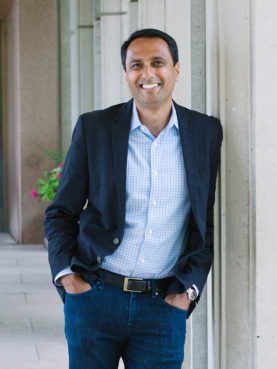(RNS) — For decades, there has been an unspoken ban on religious discussion in the workplace. And no wonder: Deeply held beliefs, not to mention religious dress or practices, can become a powder keg in corporate lunchrooms no less than at family gatherings.
But thanks to the nation’s expanding religious diversity and the recent surge in workplace diversity, equity and inclusion efforts, the business world’s unofficial taboo on religion might be waning. A growing contingent of businesses have begun talking about religion as an asset, rather than a divider.
Eboo Patel, founder of Interfaith Youth Core, said that in the last three years he’s seen an exponential increase in the number of companies coming to IFYC to consult on religious diversity. Since 2019, “one phone call a year became 12, 15, 20 requests a year,” said Patel. “Walmart, AllianceBernstein, Edelman, Starbucks … A whole set of places, from banks to PR firms to retail, reached out to us and asked us to engage on religious diversity questions.”
Brian Grim, president of the Religious Freedom and Business Foundation, told Religion News Service that “every week” he hears from a new Fortune 100 company asking how to approach religious diversity in the workplace. “There’s been a massive change in the past three to five years in some of the world’s biggest and best companies towards embracing religion as part of their overall diversity, equity and inclusion initiatives,” said Grim.
Some recognition of religious diversity is as simple as serving kosher or halal food in the company cafeteria or offering floating holidays, so days off don’t revolve exclusively around the Christian liturgical calendar. For years, companies have offered faith-based employee resource groups, or ERGs, that allow workers to organize around their religious identities.
But some companies are going further, sponsoring religious literacy trainings and hiring interfaith chaplains for in-office counseling or spiritual support.

Photo by Jason Goodman/Unsplash/Creative Commons
The companies’ motivations aren’t solely benevolent: There’s a business case for religious diversity that’s connected to overall diversity efforts and to what employees want out of their workplaces.
“Markets and market potentials are driven not only by what marketers try to get people to buy, but by these cultural and religious factors and values,” Grim said. “So businesses realize that to work in tomorrow’s marketplace, understanding religion is really important.”
Paying attention to employees’ religious practices can allow them to feel more valued, develop better working relationships and ultimately to be more productive, Grim added. This can be an edge in a globalizing workforce: While institutional religion is declining in the U.S., a 2015 study from Pew Research Center projected that globally, the world’s religious populations are on the rise.
Younger American generations continue to become more religiously diverse; they’ll expect employers to accommodate religious differences. According to a 2020 study from the Public Religion Research Institute, the median ages of white Protestants, white Catholics and Black Protestants in the U.S. are all in the 50s. In contrast, the median ages of unaffiliated people, Buddhists, Hindus and Muslims are in the 30s.

Eboo Patel. Courtesy photo
Patel observed that religious awareness can also appeal to clients. “If you’re a Starbucks in Dearborn, Michigan, where there’s a significant Muslim population, why wouldn’t you open at 4 a.m. during Ramadan?” asked Patel, who notes that many Muslims rely on IHOP for their pre-dawn breakfast during the month of fasting.
“Why wouldn’t you be the place where Muslims are going for their final cup of coffee before the day of fasting begins?” he asked.
Some companies have been promoting religious diversity for decades. Intel started its Christian employee resource group in 1995; Texas Instruments followed in 2000. But Grim said even companies that embraced ERGs early are renewing their emphasis. Craig Carter, who heads an alliance of faith- and belief-based ERGs at Intel, told RNS that the company has continued to add such ERGs, including atheist/agnostic and Baha’i groups, and last year added one for Hindus.
The ERGs are increasingly not there to please employees alone. Google’s Inter Belief Network, an ERG launched in 2017, plays a role in adapting Google’s products for religious audiences, including “Doodles” (Google’s alterations to its homepage logo) for Christmas, Hanukkah and even the Taoist/Buddhist Ghost Festival. The Buddhist chapter helped improve the translation of Tibetan religious texts for Google Translate.
Siraj Akhtar, a Texas Instruments employee since 2000, told RNS via email that the company’s conscious hospitality toward Muslims and other religious groups leads employees to invest in the company long-term. “For Muslim employees the idea that you don’t have to hide your faith or your practices, but can openly display them, is very appealing,” said Akhtar.
He pointed to the serenity rooms that are found in all of Texas Instruments’ major buildings. “Having a place where you can perform these (daily prayers) right where you work is something that sets TI apart and has been a huge influence for many who have joined the company.”
Chaplains are another way to weave religion into the corporate sphere. Greg McBrayer, an Anglican priest, is both American Airlines’ chief flight dispatcher and a company chaplain. “I’m not there to proselytize or convert people, I’m there to support them in moments of need,” he said.
McBrayer sees himself as a “spiritual first responder” who can bring the “ministry of presence” to any difficult situation, regardless of the spiritual perspective of those involved.

Karen Diefendorf, second right, director of Chaplain Services at Tyson Foods, talks with employees at the company’s Berry St. poultry plant in October 2018 in Springdale, Arkansas. (Logan Webster/Tyson Foods via AP)
At Tyson Foods in Arkansas, Chaplain Kevin Scherer oversees Tyson’s roughly 100 chaplains, including a Muslim as well as chaplains from most Christian denominations, who serve team members from more than 80 countries.
“Good chaplaincy doesn’t operate from the starting place of the chaplain’s religious faith orientation, but by being present and asking good questions to understand the religious diversity of the team member they’re taking care of,” he said. All of Tyson’s chaplains are equipped to minister in a pluralistic setting, he added, including to people who are not religious.
RELATED: Are today’s seminarians tomorrow’s corporate leaders?
Despite recent leaps in the accommodation of faith, religious diversity efforts lag far behind other kinds of diversity measures. “It’s not even close to where race, gender and sexuality are,” said Patel. “But it’s grown. If race, gender and sexuality were at a 5, and now is at a 9, religion work was at a 1, and now is at a 2.5.”
Leaders’ fear of exacerbating workplace divisions still casts a shadow, experts said. Some are also concerned that, done poorly, religious diversity initiatives can tokenize members of different belief groups without changing workplace culture.
Carolyn Chen, author of the new book “Work Pray Code,” said faith-based ERGs can provide important spaces for religious minorities in what is often an unnamed but normative white, Christian culture. “Yet when you provide these spaces, it can be like, you check the box and you’re done. It can be a way of dealing with diversity, giving people a space without changing the status quo,” Chen said.
Carter said he is frequently asked whether formalizing different religious groups at Intel causes problems. “Having or not having a formal faith ERG does not stop or start a person from having their personal beliefs,” Carter said in an email. “They will always be there. Recognizing they are there helps the employee feel included, valued personally, and that they can be real at work.”
For those wary of religious diversity, Patel says it’s better to address it head-on. “Religion is divisive, and I imagine there are a number of C-suite-level people who are not going to touch it,” he said. But these days the alternative to a proactive program, he said, is likely to “let conflict or bias land on your desk.”
RELATED: Intel leads tech-dominated list of religiously inclusive workplaces





